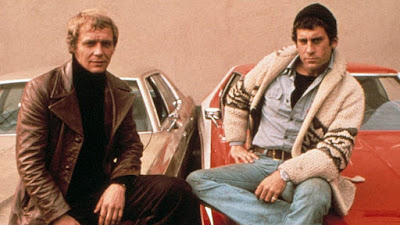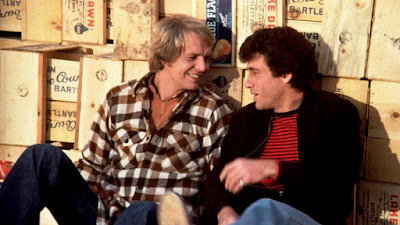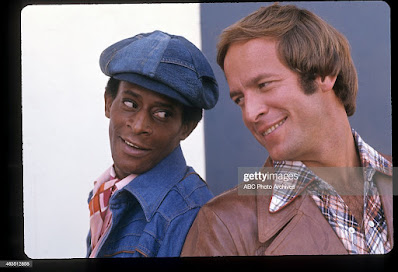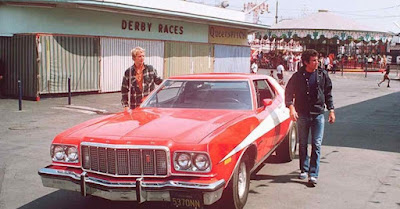In the 10+ years this blog has been around I’ve only mentioned Starsky and Hutch (1975-1979) once or twice.
It’s a show I checked out sporadically first-run, and never went back to watch again. But not long ago I was visiting a friend who owned the DVDs, and I borrowed his sets to get reacquainted with the quintessential 1970s buddy cop series.
How was it? If I say exactly what I expected, that doesn’t sound like high praise. But I knew I enjoyed it back in the day, and that it was popular enough to generate all the usual merchandise tie-ins, from action figures and a lunchbox to trading cards, a board game, and model kits for Starsky’s famous red Torino.
So what I anticipated was a series that would be rarely surprising, occasionally dated, but fun to watch. I expected at 2-3 episodes an evening it would be an easy, breezy night of television that would not require deep thought or intense concentration.
And that was what I got.
Shows like this succeed or fail on casting and chemistry. Good scripts help, but there are only so many urban crime stories and criminal investigations to dramatize. Viewers watch to see characters they like inserted into narratives no matter how familiar. And when there are two or more leads, camaraderie is another essential. We want to believe the friendships between the characters, to the point that we’re sure they would enjoy each other’s company after work as well.
It’s either there, or it’s not. With Charlie’s Angels, we could see Sabrina, Jill and Kelly hanging out (and often did). When Tiffany joined, we were pretty sure that Kelly and Kris dropped her off at the library when they went out to dinner.
With Detectives Dave Starsky and Ken Hutchinson that connection seems natural and believable from the first episode. Paul Michael Glaser (Starsky) and David Soul (Hutch) argue, kvetch and commiserate like the closest of friends and partners. There is no artificiality in the rhythm of their conversations. The actors are gone and all we see are their characters.
We don’t get to know them well beyond the duties of their profession, but that was standard for shows like this. Character development and continuity never extended beyond what was necessary, and was often inconsistent. In “The Vampire,” Starsky remains open to the possibility that a series of fanged attacks on young women could be supernatural, while Hutch scoffs at the possibility. But in “The Psychic” Hutch is convinced a man who sees visions can help find a kidnapped girl, while Starsky remains a cynic. One episode has Hutch extolling the virtues of a healthy organic food diet, but later he’s scarfing down chili dogs with his partner at a dumpy fast food joint.
The partners are often helped in their cases by Huggy Bear (Antonio Fargas), who is always tuned in to the word on the street (a convenient way to advance the plot), and is shown in a variety of professions throughout the series, only some of which are legal.
The character would likely be condemned now as a negative racial stereotype, but that crowd is listening to NPR and not watching 50 year-old TV shows, so who cares. I will acknowledge, however, that a little of Huggy goes a long way – there’s a reason why the proposed spinoff “Huggy Bear and the Turkey” never went anywhere.
When you watch a full season of any series over the course of a week or so, the stories tend to blend together into one inclusive experience that either satisfies or does not. I was satisfied, though many of the episodes seemed familiar before I even watched them, because the same plots played out on other shows from the same genre and era.
There were the “race against time” episodes like “Savage Sunday” (a bomb ticks away in the back of a stolen car – can our heroes find it before it explodes?) and “A Coffin for Starsky” (Starsky is poisoned and will die in 24 hours unless Hutch finds the only man with the antidote!). There were the undercover assignments that amp up the comedy as the partners try out silly costumes and silly accents (“The Bait,“ “Moonshine”) and the episode in which our detectives get saddled with protecting a sassy kid (Kristy McNichol, in “Little Girl Lost.”
And inevitably there were multiple episodes in which Starsky or Hutch falls in love with the perfect woman, who also happens to be hiding a criminal past (“Gillian”), or secretly an obsessed psycho (“Fatal Charm”), or just gets killed by bad guys (“Starsky’s Lady”).
Mix in a few car chases in that Torino, a few foot chases and one or two shoot-outs, all of which could be extended or shortened to fit the desired running time, and you’ve got another episode in the can.
Maybe I’m sounding too flippant – the fact is I enjoyed most of them.
And there were a few that stood out, particularly those written by Michael
Mann, who would later create Miami Vice
and write memorable films like Heat
and The Insider. In his stories the
stakes seemed raised and the criminals were more depraved. “JoJo” has the
detectives chasing down a vicious serial rapist; in “Texas Longhorn” a used car
salesman (clearly based on California’s Cal Worthington) sets out to murder the
men who killed his wife before the cops can apprehend them.
I’m probably also giving too little credit to Soul and Glaser, who kept viewers engaged for four seasons and nearly 100 episodes. I’m surprised they didn’t find a way for David Soul to sing on the show - if it could be worked into the plots for Shaun Cassidy on The Hardy Boys, they could have found a way to squeeze “Don’t Give Up on Us” into a story.
And this being the 1970s there were always guest stars aplenty: Lynda Carter, Suzanne Somers, Craig Stevens, Joan Collins, Danny DeVito, Karen Valentine, Jeff Goldblum, Kim Cattrall, plus a few that aren’t as well-known but are always welcome by true classic TV lovers – Charles Napier, Michele Carey, Roz Kelly, etc.
Word on the street (as Huggy would say) is that David Soul wanted out by season four, and that was probably just as well. The series had already dropped in the ratings and fans of cool dudes in cool cars would soon discover Bo, Luke, and the General Lee (Starsky and Hutch didn’t have a leggy cousin in denim shorts). But their show holds up, and it’s nice to know that its stars remain close friends to this day.










This was a good read, David. This is one of those shows from the 1970s I've been wanting to revisit for many years, and you brought back a lot of memories. (I don't know why it is, but that network promo of the episode where Kristy McNichol is found in a closet and stomps on one of their feet is etched in my brain!) I have old Christmas photos with Starsky & Hutch toys in the background too. How nice to know they're friends still.
ReplyDeleteThanks for reading, as always! I think you'd enjoy getting reacquainted with them.
DeleteWTF is up with Tiffany?? She was the BEST angel ever!!! Of course, jealous Cheryl Ladd couldn't stand the beauty and rallied Jaclyn to her mean gal routine. Jaclyn was upset because Shelley Hack had out-classed her! So they both played a number on Shelley but she got her revenge when Aaron Spelling hired buxom Tanya Roberts to out-boobies Cheryl. And the rest is history! Yes, I did watch an interview where Cheryl said she HATED Tanya---she said it in a way to be self-deprecating, adding (my paraphrase) because Tanya was such a beauty. She also regretted BULLYING Shelley Hack.
DeleteThat said I have NO IDEA why you had to be bee on a yacht and bully Shelley's gorgeous Tiffany?? Like wtf bro?? Mean girl much??🙄Didn't think her fans would read here, didcha? NEWSFLASH: Tiffany is very well loved and the best angel EVER even if you didn't ask me! So there. Bah-humbug to you!
Actually, Irene, Jaclyn and Cheryl were supportive of Shelley, as was David Doyle. It was writer Ed Lakso and ABC brass who thought she was not the best replacement for Kate Jackson. When I co-wrote a book on Charlie's Angels I interviewed Shelley, and found her to be very kind and realistic about her time on the series.
DeleteI remember this show today most for its Sept. 1976 MAD Magazine satire "Harsky and Stutch". They gave their boss, "Capt. Dopey", grief w/ goofy practical jokes and got the "word on the street" from "Buggy Hair". You didn't offer any opinion on Capt. Dobey. Did anything about him stick out for you, or was he just a standard issue police boss?
ReplyDeleteFairly standard issue. The scenes at the precinct were usually the least interesting.
DeleteMr. Hofstede, have you seen any episodes of the 1974 TV action series "Chopper One"? If so, what did you think? Like "Starsky & Hutch," "Chopper One" was executive produced by Aaron Spelling and Leonard Goldberg. Unlike "Starsky & Hutch," "Chopper One" only lasted 13 episodes. Despite its short run, "Chopper One" has been released on DVD in its entirety, plus it's currently available for viewing on the Crackle streaming service.
ReplyDeleteBelieve it or not, a reboot of "Starsky & Hutch" is in the works. Check out the following URL:
ReplyDeletehttps://www.tvinsider.com/1082146/starsky-hutch-reboot-fox-details/
Females reboot?? 🙄As in Cagney and Lacey but with the S&H title to make eBay searches harder and more confusing!? As if the Ben Stiller monstrosity weren't bad enough... Let me guess they will be rainbow queens?
DeleteIt took me forever to find this show in its original version because no channels reran it in decades. I finally happened upon episodes and boy, does it suck! In France, it was dubbed by fantastic French dub artists and it was HILARIOUS!!! It was a crime-comedy/drama. French humor that doesn't translate in English and is not found in the American version. If you wondered why we French laugh at Jerry Lewis... come closer, I'll tell you a secret... WE NEVER KNEW HOW BA HE SUCKED COS WE NEVER HAD ACCESS TO HIS VERSION!!! The French voice-over dub actors transformed Jerry's films into hilarious comedies with cultural humor specific to France. I never once laughed at The (original) Nutty Professor. Watched again Dr. Jerry et Mister Love (IIRC) and I was laughing at full-blast nonstop! The scene where he pulls down the old guy's pants and has him climb on the table was die-choke-laughing funny in French. In English? Pathetic! Same with Starsky & Hutch. Except France never bought the awful final seasons' episodes. I reckon those were un-translatable. I bought the DVD from France and was unable to watch it because those French bass on a tardy-line do some process to the discs so that my machine was SHAKING & spitting them out. Couldn't even use that VLAN (VLC?) player, the one with the orange cones. So I haven't seen the series in my childhood's French in...forever! 😭 In English? Sorry but the show is simply not worth it. They both lose their charisma and sex appeal.
ReplyDelete